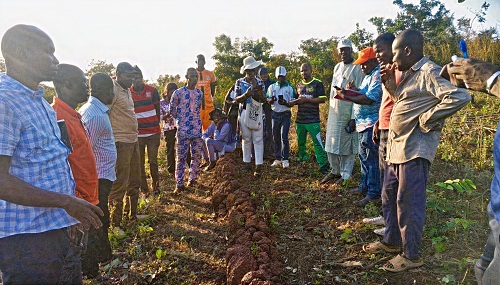GCCA+ West Africa: executive training, a structuring action to accelerate climate action.
Improving expertise on climate change issues
Availability and expertise of technical executives in the national services are two of the conditions for building climate resilience in the West African region. The GCCA+ West Africa project supports the Master's Program in Climate Change and Sustainable Development (MCCSD) implemented by AGRHYMET RCC-WAS. This educational program plays a crucial role in enabling West African countries to position executives who are well-trained on climate change issues, in order to better support implementation of the Paris Agreement at the local level and national level. "The objective of this master's program is to educate high-level executives, who, on the one hand, will know how to promote and capitalise the knowledge of climate science, conduct vulnerability studies, impact studies and adaptation studies, and on the other hand will assist their countries in integrating the climate change dimension in policies, and in local, regional, and national development programs and strategies", explains Professor Sanoussi Atta, Head of the Training and Research Department at AGRHYMET RCC-WAS and Coordinator of the MCCSD.
This one-year regional education program (Master 2), primarily targets executives and professionals in public, para-public, or private sector-services. Several executives from various West African ministries and institutions have benefited from this training program. "The knowledge acquired through the Master's Program in Climate Change and Sustainable Development, enables me to improve my methodological approach in the studies that I lead as part of my work. I have new analysis techniques that enable me to propose solutions that are far more relevant. I have many more scientific arguments to explain the phenomena. I have a better knowledge of climate risks" explains Brou Isidore Kanga Head of the Studies Unit at the National Meteorology Directorate of the Ivory Coast (DMN-SODEXAM) member of the 2020 graduating class of the CCDD Master's Program.
Promoting policies relating to capacity development for climate change
"Today, the trained executives are equipped to support integration of climate change in local, sectoral and national policies, to support implementation of the contributions determined at the national level (CDN), develop and establish programs for adaptation and mitigation of climate change and assist local authorities in greening their community development plan", states Dr. Maguette KAIRE, CILSS Focal Point for the GCCA+ West Africa project and Instructor of the CCSD Master's Program.
By training more executives at the country level, this educational program extends the link between individual development and organisational and institutional development. "In West Africa, the training offered by this master's program is in high demand. It is a very specific education program that is targeted at updated competencies in the framework of the Global Climate Action Plan and implementation of the Paris Agreement, ranging from climate governance, climate negotiations in accordance with the United Nations Framework Convention on Climate Change (UNFCCC), to adaptation and mitigation issues and climate financing. This master's program trained three graduating classes before the GCCA+ West Africa project, which made it possible to train two additional graduating classes. We have ascertained that today the graduates of this master's program are actively involved in the climate issues in their country, and today they are the national experts and the focal points present in the discussions and other negotiations concerning the climate (COP)", continues Dr Maguette KAIRE.
Given the interest generated by this training program in capacity development for implementing adaptation and mitigation measures, several voices are calling for continuation of the master's program. "Taking into account the importance of this course of study for the county in the CILSS/ECOWAS space, we urge the GCCA+ West Africa project to continue these efforts", states Safièta PARE, Spokesperson for the 2020 graduating class.

Linking the learners to field projects
"If we can link the learners to climate-smart agricultural projects and initiatives, relating to the current climate in the region, the executives could generate useful knowledge to support an informed decision-making process", enthusiastically explains Sékou Sangaré, Commissioner for Agriculture, Environment and Water Resources to the ECOWAS Commission.
The GCCA+ West Africa project, in synergy with the AEP Agroecology project funded by the AFD and the European Union, have facilitated placement of the master's degree students in the smart agricultural pilot projects relating to the climate, that these organisations support. This is the case for Vicencia DOGOLI, who completed her master's program with ECLOSIO in Benin to study the best practices of climate-smart rice cultivation and Ibrahim MATI MAHAMAN with the NGO, MORIBEN, in Niger, both were supported by the GCCA+ West Africa project. "I had worked with MORIBEN on the impact of agroecological practices on the resilience of the family farms in the Sahel, with regard to climate change, notably in the rural community of Karma in Western Niger. Our work shows that the implementation of these practices is quite varied in the commune. Likewise, we confirmed that the mitigation potential offered by agroecological practices is variable depending on the agroforestry parks and the associated practices", explains Ibrahim MATI MAHAMAN. Thus new insight and data are generated on adaptation and mitigation, as a basis for decisions to support decision-makers and executives in the field.
Towards eLearning on climate changes in the region
To make the training course on climate change more accessible and available at a reduced cost for executives and professionals, the GCCA+ West Africa project works on the digitalisation of the climate change training offerings. Thus, in 2021, the capacity development plan for "digital learning" on climate changes in West African was developed and validated by the ECOWAS Commission. A regional competence centre and coalition of actors on digital learning is under development with a feasibility study because implementation of a strategy for digitalisation of the AGRHYMET RCC-WAS training programs is planned for this year.

